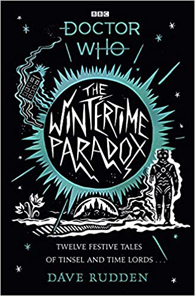 The Wintertime Paradox: Twelve Festive Tales of Tinsel and Time Lords by Dave Rudden (BBC Children’s Books, 2020)
The Wintertime Paradox: Twelve Festive Tales of Tinsel and Time Lords by Dave Rudden (BBC Children’s Books, 2020)
Dave Rudden gives us twelve Doctor Who stories so convincingly in different tones, styles and voices that you could believe it’s by twelve different authors. How you read this very enjoyable collection will depend on how you approach the relaunched series, because it is very weighted towards post-2005 Who – every Doctor from Nine onwards makes an appearance – and there is a story arc which either enhances or gets in the way, depending on viewpoint. But there are a couple of classic Doctor appearances too and, most impressively, some actual stand-alone sf.
In “A Day to Yourselves”, a still-traumatised Nine finds to his annoyance that his other selves keep getting there first to save the world. They want him to enjoy a peaceful Christmas on his own, taking some self-time before resuming his travels.
Rose and Ten go to the pantomime in “He’s Behind You”, which captures David Tennant’s portrayal and the chemistry of the characters so perfectly that you stop noticing there isn’t much story.
“Father of the Daleks” gives more nuance to Davros’s motivations, and his relationship with the Doctor, than any TV appearance since 1975. Sadly it suffers from the Daleks’ acquired habit of being held in thrall when Eleven starts monologuing, instead of just exterminating him.
Bill plays slightly more of a role than Twelve in “Inflicting Christmas”, a reflection on the nature and reliability of memory. Unfortunately a promising set-up just sort of fizzles out, like many of the Christmas specials.
“We Will Feed You To The Trees” gets the gold star: a thoughtful lost colony story with a Deathworld vibe that makes it the hardest sf and the least Christmassy in the collection. Seven finds himself on a planet with two seasons: Succour, a time of planting and preparation; and Siege, when you hope the preparations were enough.
Five appears in “A Girl Called Doubt” but the story would work without him. The aftermath of a Cybermen invasion is shaped thoughtfully by the logic of what Cybermen do to people and the lesser thought-of but inevitable consequences. There’s a twist, but we’ve seen it before on TV.
“The Paradox Moon” is the obligatory season finale that resolves the arc, doing what it’s supposed to but baffling with awestruck Whovian timey-wimey babble rather than really explore time travel in a sfnally rigorous way.
Scattered in between these we get the stories sans Doctor, which on average prove more satisfying – perhaps because they rely on actual storytelling and not the author doing a convincing imitation of whichever actor.
“For The Girl Who Has Everything” could have been called “How Osgood Got Her Scarf”: in the UNIT archives on Christmas Eve, as it happens. The only misstep here is to mention the Abzorbaloffs, thus fixing them in canon when their one TV appearance was an aberration best forgot.
“Visiting Hours” gives Rory more agency than he ever had on TV, and even succeeds in putting him one step ahead of his daughter River.
The title of “Christmas With The Plasmavores” saves you having to read the story, and you would see the resolution coming even if there wasn’t a massive hint in the opening illustration.
“A Perfect Christmas” is nicely steampunky, as befits the era: Madame Vastra tries to get her head around this strange human tradition.
“Missing Habitas Frond” is a decently done period detective story starring Missy, set appropriately in Edinburgh, 1909. Missy has always been the best Doctor’s evil alter ego since Roger Delgado’s Master and here we see exactly what can happen if she takes a liking to you.
In short, this is an entertaining collection that encapsulates a typical Doctor Who series: some good stories, some very good, and some clunkers, but if you want hard sf then look elsewhere.
